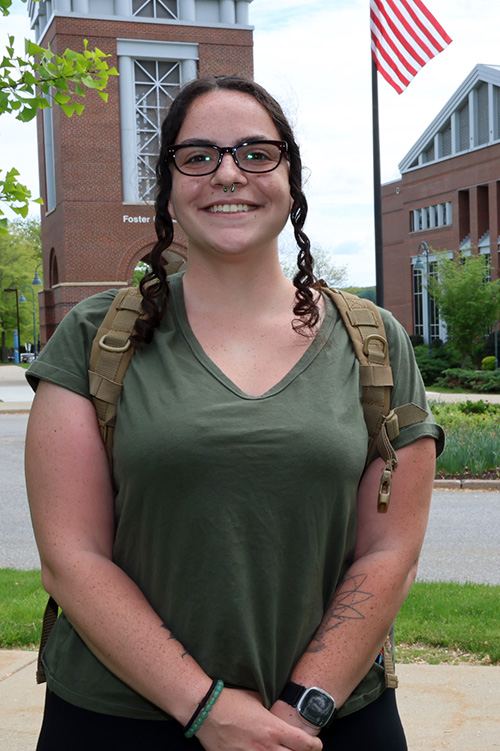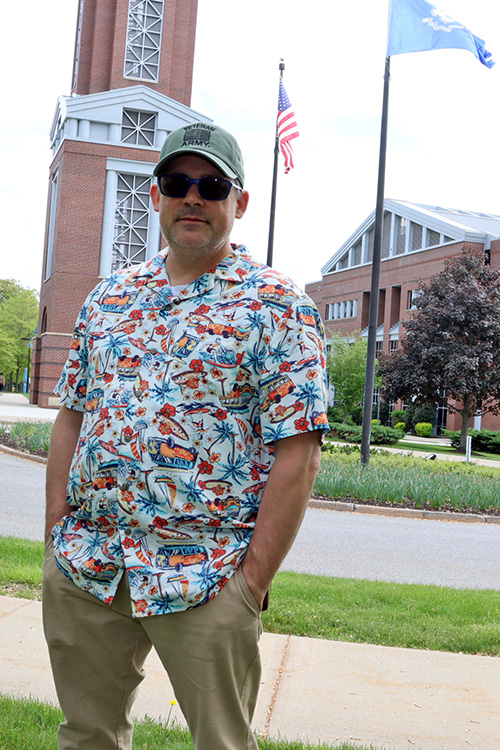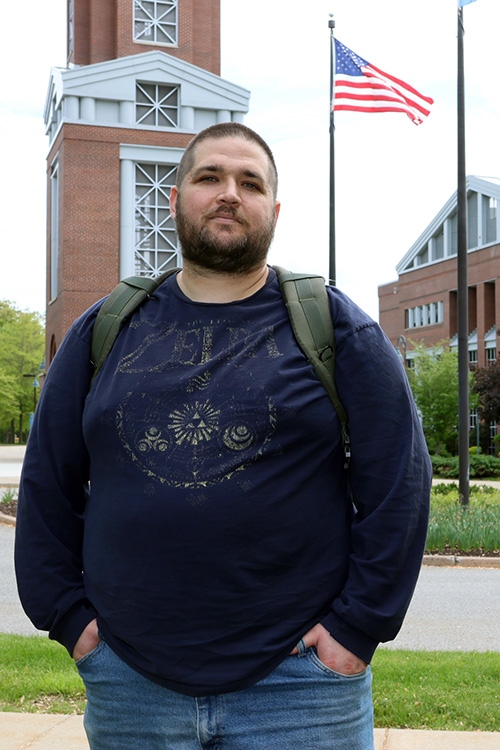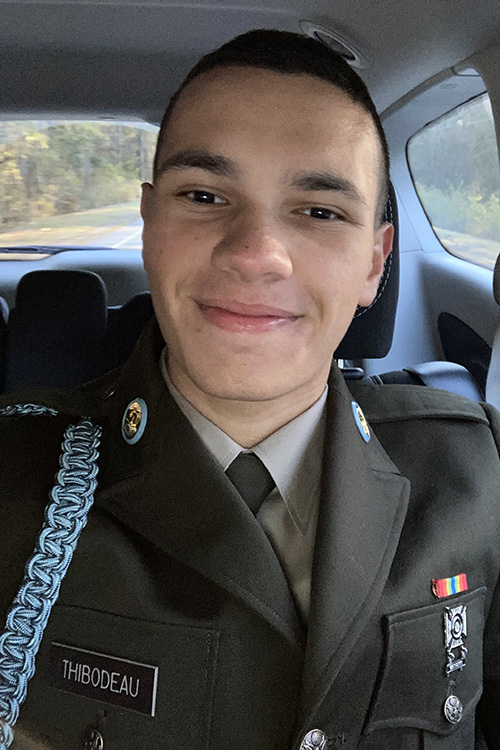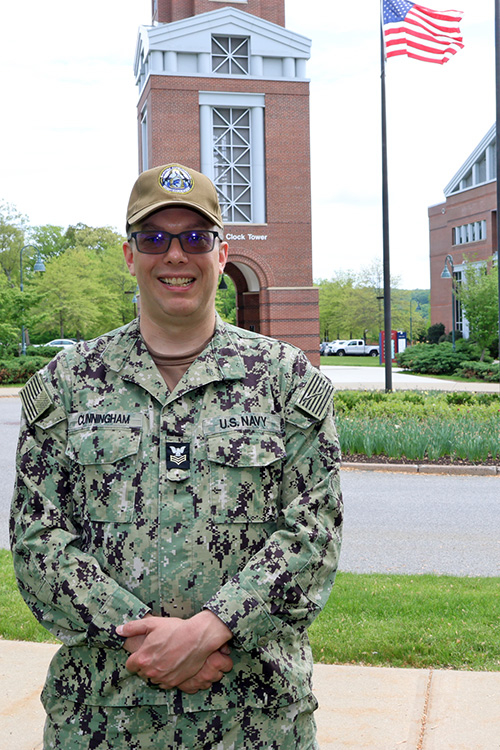- Apply
- Visit
- Request Info
- Give
Military students thrive on campus
Written by Elisabeth Craig
Published on May 15, 2025
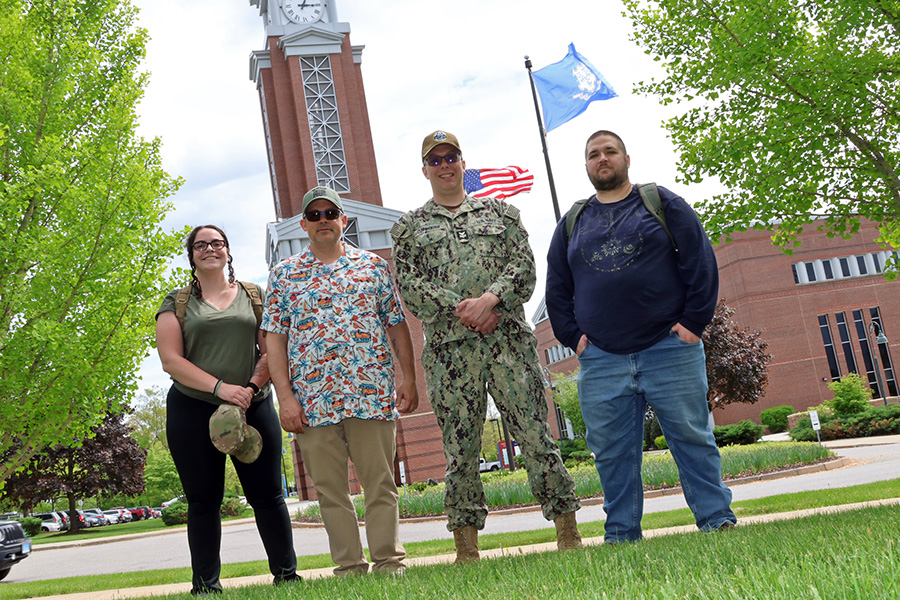
Students from military backgrounds -- whether actively serving or veterans -- have long called Eastern Connecticut State University home. Several current students, on active duty and retired, recently shared their stories of enlistment and readjustment to civilian life.
Graduate education student Andy Shetland is a veteran of both the Navy and the Army National Guard. He currently works as a high school teacher and like other veterans is attending Eastern for free on his G.I. bill.
Shetland explained a struggle that a lot of veterans have readjusting to civilian life after spending most days with their lives on the line.
“I think the biggest challenge some people have, especially if they're in combat arms, is reintegrating with society and normal life afterwards,” he said. “Having to get through that amount of time where every day you think you might die, you begin to rationalize and even accept the fact that you’re going to die.
“When a veteran returns home, it’s hard to grapple with life when you’ve already accepted death.”
He continued: “It’s fortunate that I was able to come through it and that I’m doing alright when a lot of people haven’t," he said, adding that 22 veterans a day die by suicide. "I hope to be able to help others, notably my students, to pursue careers and navigate challenges.”
Travis Cunningham is a graduate student specializing in applied data science. He spent eight years in the Marine Corps doing aviation data science and is currently in the Navy Reserves doing similar work on patrol boats.
“What I still value about the military is the camaraderie. Like other vets, I miss the people I served with,” said Cunningham. “I had a lot of great times as well as bad, but I was part of a historical squadron that released the F-35 strike fighter aircraft.”
He continued: "Eastern has been really supportive of veterans. I've always had plenty of resources and everyone's always eager to help, so I've never really run into any major challenges other than things like time management and getting used to being older than most of the other students here.”
Megan Cassada is a senior majoring in psychology and an IT specialist who worked on computers during her time in the Army. Her incentive to join the military was to help people and set herself up for a career where she could help other veterans who went through similar experiences to hers.
“I found out once I signed up that you don’t get many opportunities to help people during active duty, but I wanted to be able to leverage my experience in combat arms with things such as stress management so I can help other people who struggle with those things,” said Cassada.
“I’m particularly interested in working with female veterans, especially since less than 15% of all military personnel are female.”
Senior mathematics major Carter Kelly spent seven years in the Navy. His role as a submarine electrician ties into his current education, where he focuses on mathematical structures and applications. According to him, he had many tales from his time at sea but had a particular experience with COVID, having quarantined in the middle of the ocean.
“The Navy didn’t want to pull us into port for the risk of someone being exposed to COVID, so we would get supply drops for food and other practical things at sea,” said Kelly.
“My submarine, the U.S.S. Newport, holds the record for the longest underway time at 17 days without a port call. After I got out of the Navy, I found Eastern was a good fit for continuing my transition out of the military.”
Senior computer science major Joshua Larkin spent four years in the U.S. Marines as an information technology technician. According to him, being in the military refines one’s perception of people, giving him lots of perspective when graduating from high school and seeking a career path.
“When I was fresh out of high school, I didn't know what I wanted to do,” said Larkin. “The Marine recruiter called me up and asked me what I wanted to do.
“I said, 'Maybe work on computers.’ He said, ‘I’ve got a job for you.’”
He continued: “Any type of civil service is great experience with people and the military is a good way to do it if you think you can make it through it. It offers a unique perspective on how people grow up a little before they start going out and doing other things.”
Ben Thibodeau, a first-year psychology and criminology double major, serves in the Army National Guard as an infantryman. Thibodeau is set to go on deployment in October, and he shared several anecdotes reflecting camaraderie both in the field and in the community.
Thibodeau recalled digging a foxhole with fellow servicemen, only to be told by his drill sergeant that he had been digging in a flood zone. “We had to fill in the foxhole that we spent like four hours digging and dig a whole new one ten feet to the right,” said Thibodeau.



